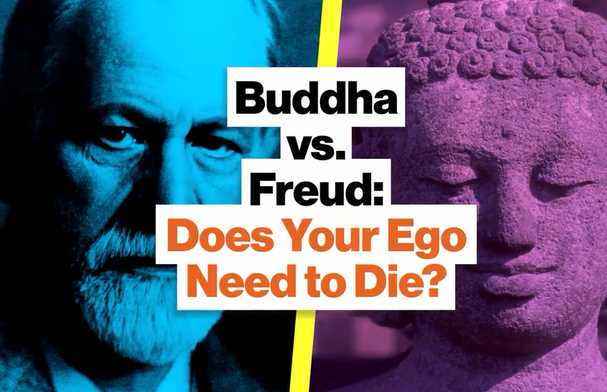(单词翻译:单击)
I think the average person who knows maybe a little bit about psychology or a little bit about Buddhism would think that
我感觉稍微懂点儿心理学或佛教的普通人会觉得
the Buddhist emphasis or the Buddhist conversation about the ego is all about getting rid of the ego completely.
佛教的重点或佛教关于自我的对话就是完全摆脱自我
There’s this notion in Buddhist psychology of “egolessness” or “no self”,
佛教心理学中有“非我”或“无我”这个概念
and most people misinterpret that—as Freud actually did—
很多人都误解了这个说法 就像弗洛伊德那样
most people misinterpret it to think that Buddhism is saying we don’t need the ego at all or we don’t need the self at all,
很多人把它误解为 佛教说的是我们根本就不需要自我 或者我们根本就不需要自己
like get rid of it and then we’re one with everything and that’s it.
就是要摆脱它 然后我们就拥有万物了

And I think that’s wrong. Obviously we need our egos.
我觉得这种理解是错误的 很明显我们需要自我
A good friend of mine Robert Thurman who is a Professor of Buddhism at Columbia, a Professor of Religion at Columbia,
我的好朋友罗伯特·瑟曼是哥伦比亚大学的佛教教授和宗教教授
he had a Mongolian teacher in the 1960s who used to say to him about this topic of egolessness or selflessness:
他在20世纪60年代有一位蒙古老师 这位老师曾给他讲过非我或无我的话题:
"It’s not that you’re not real, of course you’re “real” you have a self, but people like you—
“这并不是说你不是真的 你当然是“真实的” 你有自我 但是像你这样的人——
secular people who don’t really understand—think that they’re “really real”"
不太理解这一点的世俗之人——觉得他们是“真正地真实””
and what Buddhism is teaching is that that belief in your own “really realness” is misguided.
佛教所说的是 相信自己“真正地真实”的想法是错误的
We take ourselves more seriously than we need to; the self is not as fixed as we would like to think.
我们太把自己当回事儿;自我并不是我们想象中那么固定
The ego is born out of fear and isolation.
自我源自恐惧和孤立
It comes into being when self-consciousness first starts to come, when you’re two or three years old and you start to realize,
自我意识刚出现的时候它就会形成 那时候你才两三岁 你开始意识到
“Oh, there’s a person in here,” and you're trying to make sense of everything:
“哦 这儿有个人” 那时的你试着理解世间万物:
who you are, who are those parents there?
你是谁 父母是谁?
The ego is a way of organizing one’s self, and it comes from the intellect as the mind starts to click in.
自我是组织自己的一种方式 它源于大脑开始思考时的智力
And for many people it stays in a kind of immature place where our thinking mind, our intellect,
对多数人而言 它停留在一种不太成熟的状态 我们的思想和智力
is defining for ourselves who we are—either taking all the negative feedback like,
会给自己定义我们是谁——要么全都是消极的反馈 比如
“I’m not good enough,” and the ego fastens onto all the negativity, or the positive—the affirmation like, “Oh, I’m really something.”
“我还不够好” 自我会被这些消极束缚 要么就都是积极的反馈——比如自我确认 “哦 我还真像那么回事儿”
And the ego likes certainty, it likes security, it likes repetition, and so it’s always reinforcing its own vision of itself,
自我喜欢确定性 喜欢安全性 喜欢重复 所以它总是在强化对自己的认知
and that starts to restrict us, to confine us, to make us think that we know ourselves better than we actually do.
正是这样会限制我们 局限我们 让我们以为很了解自己 其实并不然
So to bring Buddhism into therapy or to bring Buddhism into a secular audience, it’s all about starting to doubt the ego a little bit.
所以要想让佛教加入治疗 或者让世俗之人了解佛教 就要从怀疑自我开始
Maybe you don’t know yourself as much as you think you do.
或许你并不像你以为的那样了解自己
Maybe some of those fixed ideas that have been operating inside of you since you were a little kid
或许从孩童时期就扎根在你脑子里
and conditioning the way you interact with other people, with the world, maybe those are not all so right.
并影响你与他人 与世界交流的方式的一些固定想法并不是那么正确
Maybe you’re not as really real as you think you are, and you could start to let go of some of that a little bit.
或许你并不像自己以为的那么真实 你可试着开始慢慢丢弃那些想法


